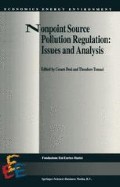Abstract
One of the central issues in environmental economics since the 1960s has been the relative efficiency of alternative instruments for pollution control. The traditional theoretical context in which the choice among instruments is examined presumes that polluters can control their emissions deterministically, emissions can be monitored accurately at little or no cost, and the contributions of each polluter to ambient concentrations are known. These assumptions are not usually characteristic of nonpoint pollution problems.1 The fundamental characteristic of nonpoint pollution is that pollutants follow diffuse pathways from their sources to receiving environmental media. In addition, discharges of pollutants or precursors often cannot be observed directly. The nonpoint problem is therefore characterized by considerable uncertainty about the contribution of individual polluters to ambient concentrations. In many instances it may not be possible to identify who is or is not a contributor from a given set of candidates.
Access this chapter
Tax calculation will be finalised at checkout
Purchases are for personal use only
Preview
Unable to display preview. Download preview PDF.
References
Braden, J., Segerson, K. (1991). Information Problems in the Design of Nonpoint Source Pollution Policy, Presented at the AERE workshop on Management of Nonpoint Source Pollution, Lexington, KY, June.
Dasgupta, P., Hammond, P., Maskin, E. (1980). “On Imperfect Information and Optimal Pollution Control”, Review of Economic Study, 47, pp. 857–60.
DeCoursey, D. (1985), “Mathematical Models for Nonpoint Pollution Control”, Journal of Soil and Water Conservation, 40, pp. 408–413.
Tomasi, T., Segerson, K., Braden, J. “Issues in the Design of Incentives Schemes from Nonpoint Source Pollution Control.” (This volume).
Griffin, R., Bromley, D. (1982), “Agricultural Runoff as A Nonpoint Externality”, American Journal of Agricultural Economics, 64, pp. 547–52.
Organization for Economic Cooperation and Development (1989). Agricultural and Environmental Policies: Opportunities for Integration, OECD, Paris.
Roberts, M., Spence, M. (1976). “Effluent Charges and Licenses under Uncertainty”, Journal of Public Economics, 5, pp. 193–208.
Segerson, K. (1988). “Uncertainty and Incentives for Nonpoint Pollution Control”, Journal of Environmental Economics and Management, 15, pp. 87–98.
Shortle, J., Dunn, J. (1986). “The Relative Efficiency of Agricultural Source Water Pollution Control Policies”, American Journal of Agricultural Economics, 68, pp. 668–677.
Shortle, J. (1987). “The Allocative Implications of Comparisons Between the Marginal Costs of Point and Nonpoint Source Pollution Abatement”, Northeastern Journal of Agriculture and Research in Economics, 17, pp. 17–23.
Xepapadeas, A. (1991). “Environmental Policy Under Imperfect Information: Incentives and Moral Hazard”, Journal of Environmental Economics and Managegement, 20, pp. 113–126.
Author information
Authors and Affiliations
Editor information
Editors and Affiliations
Rights and permissions
Copyright information
© 1994 Springer Science+Business Media Dordrecht
About this chapter
Cite this chapter
Shortle, J.S., Abler, D.G. (1994). Incentives For Nonpoint Pollution Control. In: Dosi, C., Tomasi, T. (eds) Nonpoint Source Pollution Regulation: Issues and Analysis. Economics, Energy and Environment, vol 3. Springer, Dordrecht. https://doi.org/10.1007/978-94-015-8346-6_6
Download citation
DOI: https://doi.org/10.1007/978-94-015-8346-6_6
Publisher Name: Springer, Dordrecht
Print ISBN: 978-90-481-4468-6
Online ISBN: 978-94-015-8346-6
eBook Packages: Springer Book Archive

